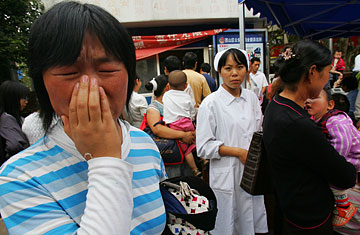
Chinese farmer Xie Rui cries over her 8-month-old son suffering from kidney stones caused by tainted Sanlu baby milk powder
As China's latest food-safety scandal continued to widen Sep. 18, hundreds of anxious parents lined up at Beijing's Children's Hospital to have their babies examined for possible kidney stones caused by toxic milk powder. It was the second day since the government ordered free checkups and treatments for sick babies, and over 500 parents had rushed to the hospital by 11 a.m. Thursday morning — so many that those who arrived at noon had no choice but to go home.
One worried mother, Mo Jingfang, said that her 14-month-old daughter had been drinking Yashili milk powder for most of her life. Yashili is one of 22 brands that have been found contaminated with melamine, a compound commonly used in plastics. Mo said her daughter had not yet shown any symptoms of illness. But other parents in line at the hospital complained that their children had discolored urine and were sweating excessively — possible symptoms of kidney dysfunction. Zhu Yongguo, who waited in line before being sent home because the hospital was overwhelmed, said his 12-month-old daughter has been sweating constantly. "Her head feels abnormally hot when she sweats, as if she was having a fever," he said.
The toxic milk scandal, which state-run news agency Xinhua said has already been linked to the death of four babies and the illness of 6,200 others, has aroused anger and despair in Chinese cyberspace. And that anger has been directed not just at the producers accused of adulterating their milk to increase profits, but also at government regulators. "Xinhua was quick to blame the dairy industry for their skewed rules, but what it didn't say was that the government also played a part in that ugly game," wrote a blogger identified as sadmoon109. Outraged citizens have noted that, in May, China's food-safety administration issued a report saying that 99.1% of baby milk powders on the market had passed safety tests. The report reaffirmed the quality of 16 dairy products previously exempted from further quality inspections — including some of those now on the blacklist.
The scandal has also spread beyond the mainland. On Sep. 18, Hong Kong's government ordered a recall of all products made by Yili, one of China's largest dairy producers, after melamine was found in nine of the company's products. There have been no reports of any sickness among Hong Kong babies caused by those products. But the local Center for Food Safety said only two glasses of the tainted Yili milk per day could be enough to cause health problems in young children.
This is not the first safety scandal related to Chinese milk. In 2004, at least 13 babies died of malnutrition in Anhui province after unscrupulous producers sold milk with no nutritional value. Melamine, a nitrogen-rich compound used in plastics and fertilizers, has been used to make milk that has been watered down appear to have more protein than it actually does. The chemical was also found in Chinese pet food exported to the U.S. that was blamed for the deaths from kidney failure of thousands of cats and dogs last year. In July 2007, China executed the former head of its food and drug administration for taking bribes in exchange for approving unsafe medicines.
China's central government has taken dramatic steps to mollify public anger in the latest tainted-food scandal. On Sep. 18, the government sacked the mayor of Shijiazhuang after allegations that the city government had covered up reports of the contamination. Shijiazhuang is the headquarters of Sanlu, a Chinese dairy giant partly owned by a New Zealand company. Sanlu, the first company to be found selling melamine-tainted milk, has been at the center of the current scandal. The government has also arrested dozens of producers for selling melamine-tainted milk to dairy companies.
But that may not be enough to restore Chinese consumers' shaken faith in either the safety of the country's food or the competence of its regulators. Luo Hexin, a migrant worker living in Beijing, said that his two-year-old son has been drinking Sanlu-brand powdered milk for a month, but said that he now worries that all affordable dairy products are unsafe. "Now we are switching to rice soups," Luo said.
